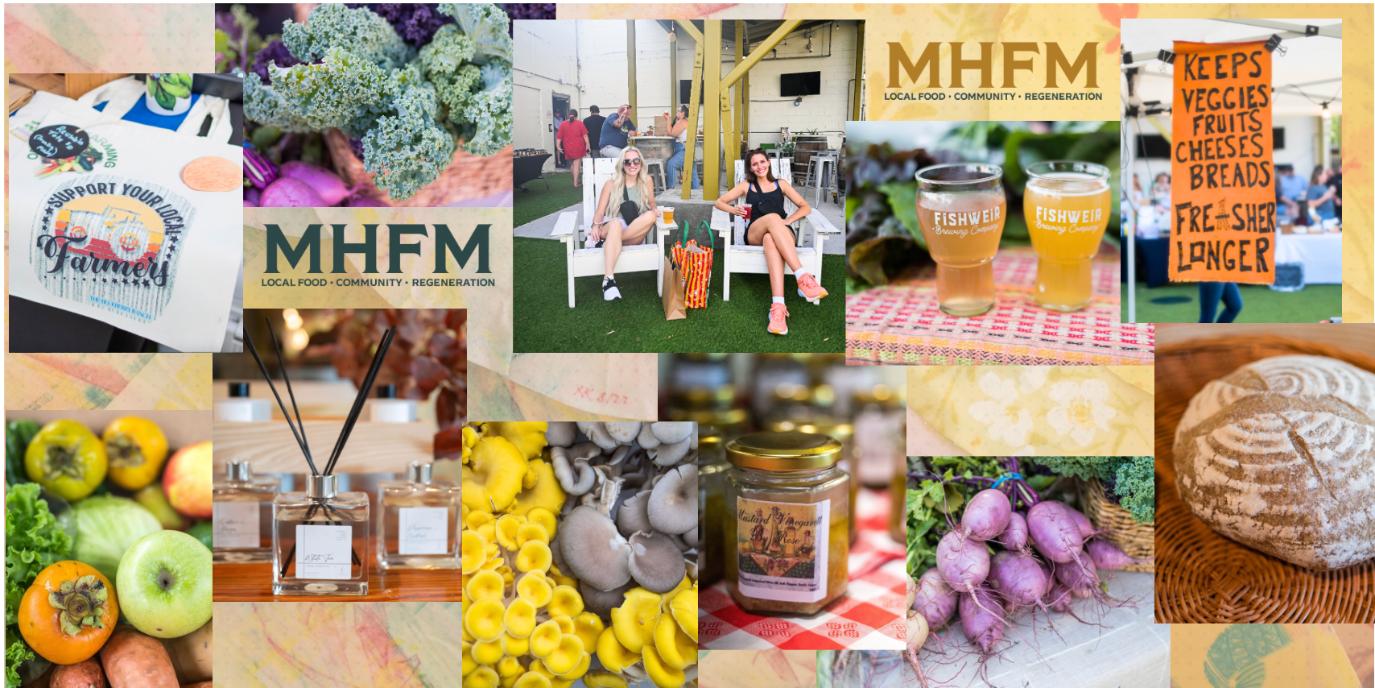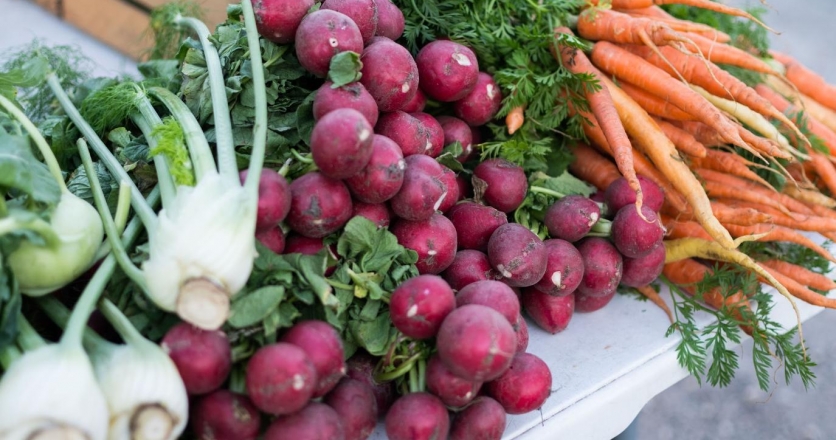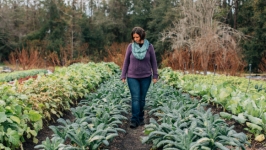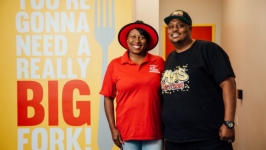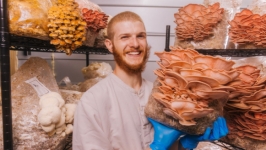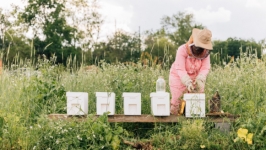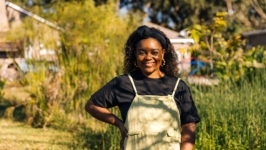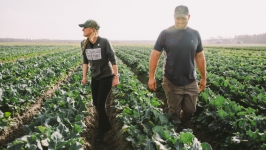Meet the Murray Hill Farmers' Market
The Murray Hill Farmers' Market (MHFM) was launched to promote the importance of regenerative agriculture, to create a more connected local food system and to foster a sense of community around locally grown food. I had started volunteering at a farm and gained a huge respect for agriculture. Then my friend Nadia Korths, who noticed I had some ideal skills for management as well as connections, particularly in the local agriculture scene and in the neighborhood, suggested I start a farmers market in Murray Hill. She and I combined our brains and hearts to develop a model for a small to medium sized farmers' market, proportional to the area in which it resides, that is centered around sustainability and food sovereignty. These are the two core values of the market. This model can be replicated in other parts of town in order to move toward the vision of a neighborhood that embodies natural beauty, ecological health and an abundant capacity. To create a more resilient Murray Hill neighborhood, we work as a community to achieve food sovereignty and regenerate our land.
The motivation behind the creation of MHFM was an appreciation for farming and a desire to connect people to the source of their food. The market provides an opportunity for a solution, for growth and for connection; in this case, connection to our food and to each other. A complex issue such as this one can be frustrating because there is no quick fix. It takes a lot of time and people that care enough to make change happen.
VENDORS
The 5 categories of vendors are directly linked to the mission:
Food grown/produced locally
Value added products / cottage industry foods (ex: pickles, breads)
Food related products (ex: wooden cutting boards/spoons)
Health / wellness / lifestyle (ex: candles, detergents, sustainable home goods)
Farming / gardening related products (ex: seeds, plant starts)
Vendor applications are scored on sustainability, locality, individuality and market viability (the likelihood that a product or service will be successful and profitable in a specific market). We made a conscious decision not to include any jewelry, art, craft or clothing vendors for this market, as we are holding a strong focus on our mission and core values.
A few vendors that are an excellent representation of MHFM are Chandanko Farms, Harmony Mushroom Co, Clinical Traditions Co, Prema Bakes and Seitanic Jax. The folks behind all 5 of these businesses are hyper-local (live within 5 miles of the market), practice or support sustainable agriculture, and play a role in bringing wholesome, high quality food/medicine directly to consumers. They are quite charming as well!
We are bringing some of the best quality groceries around Jacksonville directly to a diverse historic neighborhood that people can easily walk or bike to. One of our goals is to become a part of the FAB (Fresh Access Bucks) program, which not only accepts SNAP/EBT as currency, but doubles customers' for grocery-type foods. It’s a huge deal for low-income folks to be able to shop high quality, locally grown food; this directly ties into food sovereignty, the right to local, healthy food. It suggests a smaller food system in which the people who produce, distribute and consume food are at the heart of the food system rather than larger corporations. We hope to add the FAB program into our structure as soon as we can manage it.
MHFM prioritizes selecting vendors/farmers that practice regenerative farming, which goes a step beyond organic/sustainable farming because not only are they not spraying harmful chemicals and preservatives (which are terrible for our health), but they are using farming practices that enhance our soil more and more after each harvest. Farming regeneratively, or supporting those that do, is one of the greatest environmental impacts you can have as an individual. Some regeneratively minded vendors/farms you can find at the market include Clover Farms, Bee Grateful Apiaries, Cartwheel Ranch Meats, Southern Acre Farm and Bee Pollen Farms.
Aside from the agricultural part, MHFM is naturally regenerating community among neighbors and the local economy by keeping our dollars circulating right here. This creates strength and resiliency in our community, especially when it’s tied to our food, health and overall well-being.
Our host, Fishweir Brewing Co has been a huge help with community engagement; they're probably the most family friendly brewery I’ve been to - which is a huge plus for the farmers market. Lots of parents enjoy bringing their kids along to MHFM; they can enjoy a craft beer and enjoy live music while their kids run around the backyard and get some energy out. We’ve got a couple of yard games like corn hole and giant connect 4 to entertain folks of all ages.
Since Day 1 of Murray Hill Farmers Market (September 28, 2022), we have been fostering a sense of community with each other. It’s something that comes naturally when you bring people together that deeply care about the same things, in this case supporting local and highlighting agriculture. Someone came up with ‘the Farmily’ as a nickname for our group and it stuck. Many of the vendors support each other by collaborating on products, selling each other's products at other market and also trading/bartering items.
Vendors are encouraged to use compostable packaging when possible, and we even have a resource section on our website for this. We do not allow styrofoam at the market, and we discourage the use of unnecessary plastic. I’d like to highlight one of our regular vendors here, Seitanic Jax. They always have a small compost box next to their table that all of their food scraps go into. This sets an excellent example for other vendors as well as customers. Currently, MHFM is a drop-off option for Apple Rabbit Compost subscribers. I would love to someday have their resource recovery bins at the market every week, which separates waste into 3 categories: compost, recycle, and landfill. This is a very educational practice that definitely aligns with our values.
The goal is the same now as it was in the very beginning: to have a great selection of high quality, locally grown/produced food staples that folks tend to need on a weekly basis. We want to continually solidify this, so we can really become a one-stop shop type of market where you can get all of your grocery and home goods for the week - one that is consistent and reliable for the neighborhood. To some extent we have already accomplished this, but of course there’s also so much room for improvement!
It’s a win-win-win. Food that’s healthier for you, your community, and our environment. And we’re pretty good at having fun while we do it!


